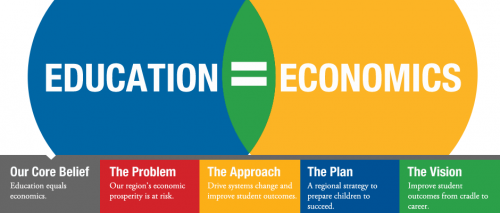Education and Economic prosperity
Every leader knows that technology is the key driver for economic growth, it creates more jobs and economic prosperities but many DO NOT know how to make it works for their country. Ten years ago, the common strategy was about building technology parks to get foreign investments and create jobs. Many countries spent millions or billions of dollars on building more parks to attract foreign companies with tax incentives and easy import/export rules etc. Today, this strategy does not work as expected. The advance of technology has changed everything with automation and robotics have taken the advantages over low-cost labors. All over the world, there are many Technology parks with empty buildings, empty offices, and a few foreign and local companies with a limited number of jobs. The economic prosperity never comes as people have wished. Of course, no one wants to admit that they have failed.
Technology Park is NOT about building special zones for factories and offices. Technology Park is NOT about providing cheap labors to support foreign factories. Technology Park is NOT about issuing special tax incentives for import/export. It is about creating INNOVATIONS to help improve the local economic growth, improve the competitiveness of a country, and the livelihood of the people. The key ingredient of Technology Park is having skilled workers and entrepreneurs. To make Technology Park works, you need entrepreneurs who start their own company and develop innovations but it cannot happen when there are NOT enough technically skilled people. And skilled people come from a quality education system so instead of investing in lands, and buildings, it is better to invest in education first.
Not long ago, when foreign companies began to withdraw and close their factories in China, there were hundreds of thousand workers lost their job and this trend is still continuing. The Chinese governments realized that they cannot depend on foreign companies for their economy anymore and have a skilled workforce to create new innovations and compete are vital to their economy. In late 2017, the Chinese government issued a five years plan to focus on improving education, specifically in technology at their top universities. They recruited the best faculties all over the world to teach there. They spent a significant salary for these talented professors to develop the most up-to-date technology training programs. At the same time, they were working hard to bring back overseas Chinese who have Western degrees and experiences to return to develop their technology industry. They were no longer content to send students overseas and lost their talents to host countries but wanted to create world-class universities of their own to ensure that they can build a strong technology industry to support their declining economy.
When many countries recognize the value of a high-quality education focusing on science and technology, others are still debating on whether to change or not or how to change for the better. Last year, in the World Economic Forum, a speaker concluded: “ Debating is another excuse for not doing anything. Quality education is a major investment of the entire country and must be taken seriously. Education can enrich the lives of people; promotes businesses; brings in prosperities, and educates the future generation for the good of the society, and the benefit of a country. By not doing it, they are denying their future generation an opportunity to thrive in this Fourth Industrial Revolution.”
Sources
- Blogs of Prof. John Vu, Carnegie Mellon University
